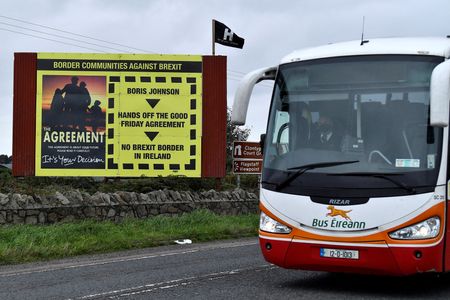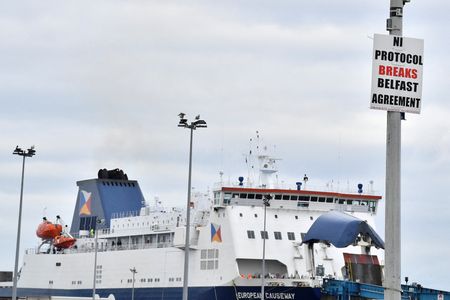By Philip Blenkinsop
BRUSSELS (Reuters) – The European Union is seeking to resolve the impasse with Britain over Northern Ireland’s trading arrangements by the end of February, aware that campaigning then begins for the province’s assembly, the EU’s chief negotiator told lawmakers on Thursday.
European Commission Vice President Maros Sefcovic, who oversees post-Brexit relations with Britain, told a closed session of European Parliament members that a window of opportunity was likely to close by the end of February, according to attendees at the meeting and those briefed on it.
Northern Ireland elects its assembly on May 5.
Sefcovic, who will also brief EU diplomats later on Thursday, and British counterpart, foreign minister Liz Truss, issued a rare joint EU-UK statement at the end of their first in-person meeting last Friday, describing the atmosphere as “cordial”.
Truss separately said she believed there was a deal to be done. The two are to meet again in Brussels on Monday after a week of intensified technical talks.
Britain and the European Union are also discussing EU fishing rights in British waters and the post-Brexit situation of Gibraltar, but it is Northern Ireland that has proven most divisive.
The British province’s trading arrangements are governed by the Northern Ireland protocol, which is designed to keep an open border between it and EU member Ireland, but which has effectively created one in the Irish Sea, angering the province’s pro-British unionists.
Sefcovic said the EU and Britain agreed that the protocol risked becoming one of the main issues in the Northern Irish assembly election.
Britain wants the removal of customs controls on goods moving from mainland Britain to Northern Ireland, but the European Union says this could become a backdoor route for British goods entering the single trading bloc unchecked.
Sefcovic told lawmakers there was no clear progress on substance. The EU wanted guarantees and might be more flexible on checks if Britain gave it full access to data on goods transported across the Irish Sea.
The Commission vice president would not be drawn on the possible impact of Britain’s “partygate” scandal, which has led to growing calls for Prime Minister Boris Johnson to step down.
(Reporting by Philip Blenkinsop; Editing by Alex Richardson)











